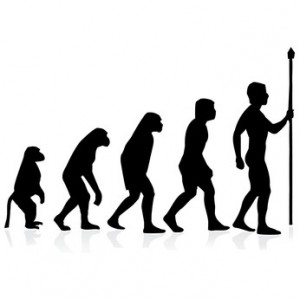Have you heard the new diet trend? It’s the ‘Paleo’ diet, primal diet or the caveman diet.
I guess it’s not exactly what I would call new and trendy, since it is based on the diet that our ancient ancestors ate. ‘The Paleo Diet’ is actually a term that author Loren Cordain, PhD coined for his book.
There have been several variations on this same type diet, including "The Primal Blueprint" by Mark Sisson, Weston Price’s Traditional diet, and my own, “Fat Burning Kitchen Program” diet. And if you like Michael Pollen, his dietary principles follow along the same lines too.
Scientists have finally started to figure out that the diet of our ancient ancestors may possibly be the best diet overall for our modern bodies.
This diet is basically avoids all processed foods, grains, sugar, dairy, and legumes.
Is it any wonder that in today’s world there is so much illness, obesity, heart disease, cancer, and other disease?
Today’s diet is a far cry from that of our ancestors.
Interestingly enough, our ancient ancestors were strong, healthy and were far more likely to be killed by a woolly mammoth or saber tooth tiger than a heart attack or diabetes.
If you would like to see a graphic presentation of the differences food makes on people, check out Weston A. Price’s book, Nutrition and Physical Degeneration–written in the 1940’s by a dentist who traveled the world studying primitive cultures and their diets.
It’s eye opening, to say the least!
In a single generation, these natives go from the picture of health to unhealthy, diseased and deformed, and it has nothing to do with saturated fat, but everything to do with sugar and processed grains.
These photographs of Dr. Weston Price illustrate the difference in facial structure between those on native diets and those whose parents had adopted the "civilized" diets of devitalized processed foods. This occurred in all different primitive groups all over the world.

This, and my own dietary evolution, has convinced me.
And I am more convinced the further away I move from processed foods, grains, sugars and more towards this ‘primal’ way of life.
The dramatic health benefits that result from this type of diet, seem virtually endless.
It reduces, prevents or cures: High cholesterol, high triglycerides, high blood pressure, cancers, heart disease, diabetes, auto-immune diseases, inflammatory disease, arthritis, joint problems, allergies, digestive problems, depression, ADD, and so much more.
That alone speaks for itself.
Let me add that my own dietary and health journey can vouch for the fact that this diet really seems to be working. In the past, I had health issues like asthma, allergies, celiac disease, arthritis, depression, frequent colds and flu, digestive issues, fatigue, foggy-headedness, PMS, rashes, and more.
With each dietary ‘tweak’, I moved closer to THIS diet.
Isn’t it another low carb diet? Well…no.
However, our paleolithic ancestors did eat a pretty low carb diet. Different primitive societies did eat varying combinations of animals, plants and carbs, but generally the human diet was about 2/3 animal foods, and 1/3 from plant foods.
And no one cared about saturated fat and cholesterol either.
Along came the agricultural revolution and the cities, civilizations and manufactured foods. And, a boatload of nutritionally-related diseases that were totally unknown to the hunter-gatherers. These new foods are vastly different in so many ways from the real, healthy foods our hunter-gatherer ancestors ate.
So, I guess in a sense, we can blame the agricultural revolution for bringing us most of the chronic disease and obesity that we see in this modern world.
These mostly grain-based foods (cereals, dairy products, grain-fed meats, high fructose corn syrup, refined sugars and oils) do not work in bodies that were originally built for a diet of free-ranged meats, fruits, nuts, and vegetables.
The paleo diet is high in healthy omega 3 fatty acids, and Conjugated Linoleic Acid, low in omega 6 fatty acids, low on the glycemic index, high in USABLE natural nutrition, high in antioxidants, and no empty calories, no chemicals, or over-processed carbs.
And here is an interesting study: Medical researchers released results of a study that shows just how beneficial a primal diet can be:
A group of non-obese volunteers were fed a paleo diet for 10 days. Only 10 days!
And the conclusion is… Even very short term consumption of a paleo diet improved blood pressure, glucose tolerance, decreased insulin secretion, increased insulin sensitivity and improved lipid profiles in healthy sedentary humans.
I am not surprised. I’ve seen my lipid profile, my blood pressure, and blood sugar levels. All of them, off-the-charts excellent.
Primal Diet Principles:
- Eat REAL food. No packaged or processed foods. Make your meals from combinations of one-ingredient foods and spices.
- Avoid most sugar, including: sucrose, fructose, agave (fructose), artificial sweeteners, and corn syrup. You may have small amounts of raw honey, maple syrup, raw cane sugar, and stevia if needed.
- No grain. Not ‘whole grains’, and especially not refined, processed, white flour. No refined starches.
- Eat plenty of healthy fat–from: grass fed meat, grass fed butter, pastured eggs and free range poultry, wild caught fish, raw dairy, avocado and coconut. Extra virgin olive oil is ok, although I’m guessing a caveman probably didn’t eat this.
- High quality protein is important. Grass fed, pasture raised, or wild caught–meat, fish and poultry, and eggs. No grain fed, commercially raised meat.
- Eat lots of vegetables–locally grown is best, and fresh, raw or barely cooked. Organic if possible. Some fruit is ok, but our modern fruit is very high in sugar.
- Eat organic. Eat them as close to where they grew as possible and in the most natural state.
- Beware of what you are drinking. While I doubt cavemen drank their ‘cuppa joe’ to get going, drinking one cup of organic coffee or tea won’t ruin the diet. An occasional beer or glass of wine is ok, but a sugary, artificially flavored mixed drink is NOT ok. No fruit juice…these are full of sugar. Drink pure water as much as possible.
Many pro and amateur athletes are gravitating towards this type of diet as evidence comes in that it improves athletic performance and endurance, reduces body fat and helps add lean muscle. So, as of this writing, I am going to follow this diet as closely as possibly during the bicycling racing season this summer, and I will report back to you how it goes. Looking for more info?
There is plenty of information on the internet. One of my favorites is Mark Sisson’s site, Mark’s Daily Apple. This guy knows his stuff. Great articles, lots of entertaining and interesting info, and a lot of awesome recipes to help you get a better idea of how truly good food can be even without grains, sugar, or processed food. And I have to put in a plug for my own website, Simple Smart Nutrition which is based on this type of diet, with tons of great information on various health conditions, from weight loss to maximizing your athletic performance and more. And I have some delicious Paleo-style recipes too.
The very best way to check out the Paleo diet is to try it yourself. Even if you just follow principle #1 you will improve your health as you remove all of the junk, fast food, and “frankenfood” in the typical American diet. Healthy and feeling good is normal.
Feeling tired, getting sick, gaining weight and all those other health issues are not normal. And, if you decide you just can’t commit to a Paleo diet, try following a few of the principles above and I guarantee you will see and feel so much better! Sources: Mark Sisson, The Primal Blueprint, Mark's Daily Apple, 2011. Jennifer Pinkowski, Should you Eat Like a Caveman? Time magazine, Jan 2011. Dr. Loren Cordain, the Paleo Diet, 2010-2011.



This sounds so similar to the idea behind Clean Eating. Would you agree it's pretty much the same thing? I just did a post myself on how I want to make a more conscious commitment to eating clean, and while my diet is pretty good already, there are definitely aspects that can be tweaked! I'm intrigued to hear, too, that the Paleo diet helped your asthma–I've had asthma my whole life and that would be awesome if tweaking my diet would help it!
I love your blog and have printed off this post- I look forward to reading and re-tweeting your newsletter!
Thanks SO much! I normally have really bad spring and fall pollen allergies and going grainless and sugarfree pretty much makes them go away. It’s pretty amazing. I used to have asthma and had to have an inhaler when I rode.
Please let me know if there is ever a topic you would like to see…I’ll be happy to research and write it. I also have quite a few more I want to add, just have to re-work them a bit. Please stay tuned! 🙂
Hey Cat, this is a great article. I eat very well most of the time and implement most of what you say here. However, I have never taken the step to eliminate all the grains. I keep hearing more and more about this though so I think I’m going to take the plunge and see how it goes. I love biking too and it would be interesting to see how it affects the season. I love the encouraging and helpful way you presented this…very nice job! I see I’m going to have to spend a lot more time on your site. I didn’t realize how much helpful stuff you had on there. Thanks for sharing!
I have the Primal Blueprint sitting on my bookcase. I need to go back and refocus because I know this is the best way to eat for me.
Awesome….